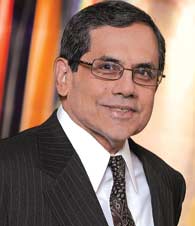|
Executive Interviews: Interview with John C Camillus on Business Model Innovation
May 2009
-
By Dr. Nagendra V Chowdary
 John C Camillus
John C Camillus Donald R. Beall Professor of Strategic Management, Joseph M. Katz Graduate School of Business and College of Business Administration. 
The world is in the midst of an
unprecedented crisis created by a few
greedy investment bankers. The
effects of this crisis are quite
pronouncing. How important is it to
innovate business models in these
troubled times? Are there any best
practices that the companies can
emulate?
The only, rather faint silver lining of
this crisis is that organizations and
governments are rethinking their
‘business models’. These troubled
times are resulting in dramatically
different business contexts and new
business models are surely needed.
You may recall that with the
explosion of information technology
and the near-universality of Internet
access, Jack Welch as one of his final
initiatives demanded that every
business in GE create a new business
model incorporating IT capabilities in
order to respond to what he
perceived as a technological
disruption. He, most appropriately,
called the initiative
“DestroyYourBusiness. com” or
“dyb.com” for short. Every
responsible CEO has to be thinking
today about how their organizations’
business models should be changed,
perhaps destroyed, in response to the
emerging discontinuity in the global
economy and in geopolitics. Regarding the best practices in today’s
challenging and unprecedented
context, I would like to limit my
recommendations to three that I am
firmly convinced are of signal
importance and offer potentially
enormous benefits at a manageable
cost:
- First, organizations should review
and affirm their identity – their
values, aspirations and competencies
– and employ this identity as a litmus
test to ensure that every refinement of
the business model, every strategic
choice and every significant operating
decision is in alignment.
- Second, organizations need to
consider employing the criterion of
humanity to stimulate their thinking
about innovative business models
and competitive strategies. This
means recognizing that enhancing
quality, safety, environmental and
social sustainability, and diversity in
the workforce and leadership offers
the potential to improve profit
performance both immediately and in
the long term. This also means
searching for underserved market
segments that have been under the
radar and understanding the impact
of the globally inter-connected nature
of the economy on their business
models. The present crisis would
have been much less serious if the
“greedy investment bankers” you
refer to had employed humanity as a
touchstone for their business
decisions.
- Third, organizations have to
respond appropriately to the wicked
nature of the problem by employing
feedforward techniques, engaging in
deliberate and thoughtful
experimentation, meaningfully
involving significant stakeholders,
emphasizing communication using
Web 2.0 approaches, and seeking
strategic insights emanating from
robust actions identified through
possibility scenarios and Pareto
analysis.
In short, affirm and realize your
organization’s identity, understand
and embrace humanity in managerial
decision making, and recognize and
respond to the wickedness of the
challenge.
|
The interview was conducted by Dr. Nagendra V Chowdary, Consulting Editor,
Effective Executive and Dean, IBSCDC, Hyderabad. This interview was originally published in Effective Executive, IUP, May 2009. Copyright © May 2009, IBSCDC
No part of this publication may be copied, reproduced or distributed, stored in a
retrieval system, used in a spreadsheet, or transmitted in any form or medium –
electronic, mechanical, photocopying, recording, or otherwise – without the permission
of IBSCDC. |
